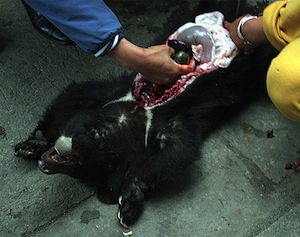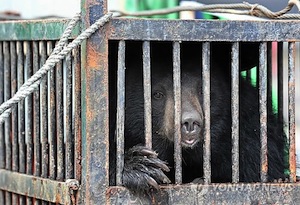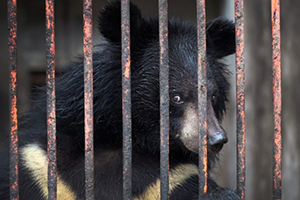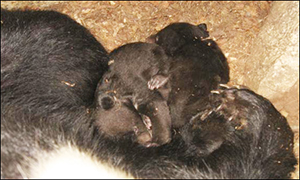In Korea, CITES are under Ministry of environment who doesn't have enough power to regulate bear farming industries in the country.
We believe there are only 2 designated officers who work to regulate all farmed bears in Seoul Hangang and Kumgang area- they change their term in every few years or even less to avoid corruption.
Under this circumstances, we cannot expect CITES can do their best work.
Moreover, there are not any International animal organizations in the country monitoring these systems.
We would suggest that they locate their office in Korea with clear signage.
There need to be an ultimate unification of animal welfare organizations to save animals.
Without this, animals are doomed.
I am disappointed with terms of housed bears.
It is not 'housed'- they are jailed for their lives.
By: Jenny R. Isaacs
January 31, 2013
In the forests of Asia, bears are being captured. These captives will be sent to bear farms, most unregulated and illegal, where they will be kept alive in a small cage, locked away for life. Their bodies will be used as renewable natural resources, from which profit will be made through the extraction of internal organs and fluids. By surgically inserting a permanent catheter into the bears' gall bladders, "farmers" extract several
ounces of their bile. In a cycle of exploitation across east Asia, traditional medicine shops receive these daily shipments of bear bile products, while consumers support the industry through the purchase of these products, sustaining a supply-and-demand chain that puts more and more bears in cages as wild populations dwindle.
"While bear conservation is a global concern, the hotspot is definitely Asia where poaching, trade, and demand are greatest," says Chris Shepherd, TRAFFIC Deputy Regional Director in South-East Asia, who is working to
break the bile product supply-and-demand cycle which is built on the illegal capture and exploitation of already endangered bears. He and his team are dedicated to investigating and interrupting the many links of the
bear bile commodity chain as it snakes across Asia; from the many still-wild places where bears are captured, to the bear-processing farms where products are harvested, to the shelves of traditional medicine shops, and into their final destination: the bodies of human consumers.
Shepherd explained to mongabay.com that TRAFFIC, a wildlife trade monitoring network, plays an essential role in stopping wildlife crime as it "investigates the nuts and bolts behind the trade, and works to see action is taken to tackle the illegal trade, and ultimately to reduce demand for threatened/illegal species."
As the leading author of a recent TRAFFIC report, "Pills, Powders, Vials and Flakes: the bear bile trade in Asia," Shepherd hopes to educate the world to what he calls the "horrendous" practice and industry of bear farming and bile extraction.
*Farming bears*
Three species of bears are harvested for their bile: The Asiatic black bear (*Ursus thibetanus*), otherwise known as the moon bear; the sun bear (*Helarctos malayanus*); and the brown bear (*Ursus arctos*). Both the Asiatic black and bear and the sun bear are listed as Vulnerable on IUCN Red List.
"Few know much about these species and even fewer are doing anything to solve the conservation problems both species face. Valiant efforts by a number of committed individuals and organizations to address the welfare issues in the horrendous bear bile farming are underway, but few conservation organizations have taken on bears as species in need of attention," Shepherd says.
The TRAFFIC report warns that there could be fewer than 25,000 Asiatic black bears left in the wild, and sun bear populations have declined by more than 30% over the past 30 years, due to massive deforestation and uncontrolled poaching. The brown bear, listed as Least Concern, is also farmed for its bile, although little is known about the status of this species in the region.
Shepherd's report details what is agreed about bile—that it is a "liquid substance produced by the liver and aids in the digestion of lipids in the small intestine in many vertebrate species including humans"—and explains its value within Eastern traditional medicine. Bear bile has been used in traditional Chinese medicine for 2000 years and is currently found in various forms for sale including whole gall bladders, raw bile, pills, powder, flakes and ointment. It is purchased and consumed to treat hemorrhoids, sore throats, sores, bruising, muscle ailments, sprains, epilepsy, and to 'clear' the liver. But unlike rhino horn, which scientists say is the medicinal equivalent of eating one's fingernails, studies have shown that bear bile does indeed have some medicinal value.
"However, research has also found more than 50 legal herbal alternatives, plus there are loads of synthetic alternatives. The key is to educate people and encourage them to use legal alternatives, alternatives that do not involve illegal trade in threatened species," Shepherd says. In order to extract the bile, bears are either captured from the wild or born into what are referred to as "bear farms," which utilize human-invented bile extraction techniques. The TRAFFIC report describes several common methods of bile extraction from captive bears: including using an ultrasound to locate and puncture the gall bladder, inserting a permanent incision in the abdomen and gall bladder or a metal catheter that uses a permanently implanted metal tube to access bile, a "full-jacket" method that also employs a permanent catheter tube to extract the bile which is then collected in a plastic bag set in a metal box worn by the bear, and finally simply removing the gall bladder whole.
The TRAFFIC report states that whatever method is employed, "Farmed bears are often kept as captive individuals, rather than in groups, with little or no space provided for animals to socialize or mate in other areas."
Bears subjected to such unregulated treatment are often malnourished and in poor health, living to an average age of five years, (though healthy bears can live until age 35 in captivity and 25-30 years in the wild). If the bears live past age five, they are most often killed around age 10, since by then their productivity usually drops off.
The fates of wild and captive bear populations are coupled.
"As captive bears become less productive, they are replaced and there have been numerous accounts of farms using wild bears to replenish their aging stock," explains the TRAFFIC report.
Shepherd, citing research that proves the demand for bear bile puts pressure on wild bear collection, rejects the notion that farm bears (who are born and die in the facilities) somehow protect wild bears from collection.
"Bear farming is a misleading term," he says. "The word 'farming' implies to many that the bears are captive-bred, and that these facilities might take the pressure off wild populations. Unfortunately, in Southeast Asia, this just is not true. The 'farms' are better termed 'bear bile extraction facilities.' None of the farms visited by TRAFFIC have any breeding facilities and employees of these farms themselves have admitted all their bears are sourced directly from the wild."
For example, in Vietnam, forests are becoming devoid of bears due to illegal hunting. Research has shown that bears are regularly sourced from countries such as Cambodia and Lao PDR, where cubs destined for bear farms
in Vietnam can be sold for around $100. As an example, Shepherd's TRAFFIC report details a firsthand account in 2006, where a bear farmer in Vietnam told Animals Asia that bear farms paid rural villagers to trap 12 wild bear
cubs per year in order to supplement farm stocks.
Though used as a resource to draw from, in their servitude bears work as a large force of enlisted laborers within a market system. Shepherd says that in China today, an estimated "97 farms housing 7,000 to 10,000 bears remain in operation" and in Asia more broadly, a minimum of 12,000 bears are currently estimated to be housed in both illegal and legal bear farms.
"The case of bears, and the undeniably brutal economy that surrounds them, clearly compels us to pause and think about the suffering and labor of things that are not people," the political ecologist Paul Robbins recently
wrote.
*Bear farming pays: the economic geography of bile*
Since bears can be kept alive and "farmed" over many years, bear bile serves as a renewable natural resource, procuring steady and guaranteed streams of profit as long as there is demand and lax enforcement of existing laws. Because high demand makes business lucrative, bear bile trading takes place on a massive scale for massive profits.
There is good money to be made from bears. Bile product prices range dramatically depending on the country or territory surveyed, but the TRAFFIC report estimates that prices for whole gall bladders were as low as $51.11 (Myanmar) and as high as $2,000 (Hong Kong SAR). For gall bladder by the gram, the least expensive was $0.11 per gram (Thailand) and the highest was $109.70 per gram (Japan). Pill prices ranged from as low as $0.38 per
pill (Malaysia) to $3.83 per pill (Thailand).
"The scale of the bear bile trade in Asia is large, with several countries playing dual roles as producers and consumers," writes Shepherd in the report.
Seeking to examine the movement of bear bile and capital across the Asian landscape, Shepherd and his team conducted surveys in traditional medicine outlets and bear farms located in the thirteen countries and territories where bear bile is sold including Cambodia, mainland China, Hong Kong Special Administrative Region (SAR), Japan, Republic of Korea, Lao People's Democratic Republic (PDR), Macao SAR, Malaysia, Myanmar, Singapore, Taiwan, Thailand and Vietnam.
The report found that "live bears and their parts and derivatives are openly sold in [traditional medicine] outlets, [traditional medicine] shops, privately through dealers, from bear farms and through a variety of other sources… Bear parts and derivatives are heavily traded. These include the paws, skin, claws, canine teeth, skulls and most prized of all: the gall bladder and bile.
" Shepherd's team also traced bear bile products found in traditional medicine shops back to their place of origin. He described how easy it was to mongabay.com: "In the vast majority of places surveyed, collecting data on the illegal trade was simple, indicating a lack of fear of prosecution on the part of the dealers. In virtually all cases, retailers were fully aware that the trade in bear parts was illegal."
Findings from the TRAFFIC investigative report reveal an extraordinary movement of bile products across the landscape and over national borders, illustrating a sprawling network of distribution along the commodity chain.
For example, in just a 12 day period, researchers in Myanmar found bear parts representing a minimum of 215 bears being openly traded in border markets near China and Thailand. The authors of the report summarize that "all of the countries/territories surveyed were observed to have a significant amount (22% to 100%) of bear bile products originating in other countries/territories for sale. Mainland China was the most commonly reported place of origin...In Myanmar, cross-border-sourced gall bladders were reported to be entirely from Lao PDR. In Hong Kong SAR, 100% of pills (where origin could be determined) were reported to have originated in Japan. In the Republic of Korea, 60% of bear bile products were reported to have been produced from wild bear populations in Russia; in Russia hunting and trade of brown bears is legal."
More troublesome, with such a vast and thriving network of suppliers, distributors, and consumers, the bear bile industry now runs at a surplus, which, according to market economics, must therefore invent new outlets for its product. Shepherd described a bear bile traditional medicine industry that has become self-perpetuating, wherein "the surplus of farm-produced bile has led to the use of bear bile in more products, thereby potentially generating more consumers and increasing demand."
*The limits of the law*
In recent years, more attention has been paid to the problem of bear farming and trade in bile products. Mobilized to act, politicians and wildlife management agencies have taken some steps to break the commodity chain. Calling it a "monumental" and a "tremendous step forward in the overall bear conservation effort," Shepherd explained to mongabay.com the significance of the September 2012 motion to phase out bear bile extraction facilities stocked with wild-caught bears, which was overwhelmingly passed at the IUCN World Conservation Congress, held in Jeju, South Korea.
"This is the first IUCN resolution pertaining to bears ever, and had overwhelming support from IUCN Government and NGO members," he says. "The resolution calls for not only the closure of illegal farms, but also the promotion of legal herbal and synthetic substitutes…While we still have a ways to go, the stamp of the IUCN, an organization focused solely on issues of conservation concern is one of the most encouraging developments to date in the struggle to ensure bears are treated as priorities for conservation efforts."
While there are increasing international efforts to minimize wildlife crime, such as prohibitions of the sale and cross-border trade of bear bile, Shepherd and his team say these laws and conventions just aren't working. "Times are changing and many traditional medicine practitioners now promote legal herbal and synthetic alternatives to medicines containing bear bile. Unfortunately, others are working hard to promote the use of bear bile, despite laws being in place to protect both species [of Asiatic bear]," he explains.
The use of bear bile is legal within some Asian countries, but the cross-border trade of bear bile products is prohibited by the Convention on the International Trade in Endangered Species of Wild Fauna and Flora (CITES) and yet still occurs throughout the region.
"Clearly, CITES Parties are failing to curtail illegal bear bile trade and, ultimately, to protect bears from exploitation," reads the TRAFFIC report. "Unbridled illegal trade in bears and bear parts continues to undermine what could be, and should be, the world's most powerful tool to regulate cross-border wildlife trade. As the Convention is legally binding, it must implement and enforce CITES regulations. However many countries have yet to follow through on this obligation."
But the reality on the ground, according to Shepherd, means that there are few real deterrents to the booming trade.
"To date, success stories in Southeast Asia are few and far between, and the trade remains widespread. With regards to the bear trade, CITES is not yet being used as an effective tool to reduce demand. National laws are not
being used to their maximum potential and the result is that traders continue selling these products with little fear of the law…Enforcement levels, and successful convictions of those involved in the trade, from the poacher, through the dealers, to the consumers, needs to be greatly increased if laws are to benefit bear conservation and if there is to be any meaningful deterrent."
To solve these problems, Chris Shepherd as both TRAFFIC and as the IUCN SSC Bear Specialist Group co-chair on Trade, is currently focusing much of his work in Southeast Asia on Lao, Myanmar, Malaysia and Vietnam to investigate the trade and work with authorities to take action. But the obstacles are many.
"Corruption, collusion and sheer complacency are really the obstacles that stand in the way of effective enforcement," Shepherd explains. "Resources and increased capacity would be increased and enhanced if tackling the
issue became a true priority. In most places, sufficient laws and capacity already exist. If the will was there, the trade would be largely shut down overnight."
*The role of consumers in ending wildlife crime*
Individuals like Chris Shepherd and organizations like TRAFFIC are on the front lines trying to protect species from the negative human impacts.
While there are some hopeful signs of change, the outlook for many species of endangered wildlife, hunted and exploited for profit, is getting worse by the year.
"One only has to start following wildlife crime related news stories to see that currently the war is being lost. More rhinos killed this year than ever. Ivory trade levels higher than they have been in decades. Tiger populations down from 100,000 less than a century ago to an all time low of about 3,200 animals in the wild. And these are the high profile species.
Dig a little deeper and you will find that a vast array of lesser known species are in the same sad situation. And what's worse, efforts to address the threats these poorly-known species are facing are far less than those for the higher profile animals," Shepherd told mongabay.com. In the end, however, consumer demand drives wildlife crime, such as the trafficking of bear bile and other illegal products (like elephant ivory, rhino horn, etc).
"Continued and increasing demand for bear parts and derivatives is at the core of the problem," Shepherd says. "As is the case with many threatened species, traditional use is a driver. In the case of Southeast Asia's bears, gall bladders and bile are in high demand for medicinal purposes, and paws and meat for consumption (often believed to have beneficial effects on one's health). Reducing demand for bears, their parts and derivatives, is absolutely essential."
The TRAFFIC report describes the spiraling, reinforcing relationship between bear bile supply and demand.
"Widespread availability means it is more likely practitioners will prescribe bile. Widespread and easy access to bear bile products has led to consumers using the products not just for traditional medicinal reasons, but increasingly as non-traditional health tonics, in the ingredients of beauty products etc."
In addition to the problem of farmed bile oversupply, which necessitates a wider market with more consumers, an increase in affluence across East Asia is also driving demand.
"As people have more disposable income, a trend seen in China and other nations with growing economies, access to wildlife products increases, for luxury, food and traditional medicines," Shepherd told mongabay.com.
But the good news for wildlife is that the cycle of exploitation starts and ends with us, as consumers and concerned citizens. If there are no customers to buy products such as ivory and bear bile, then those who profit from wildlife crime will be forced to conclude their business is unprofitable. Instead of consumers being part of the problem by sustaining market demand, engaged communities can be part of the solution.
Positive change for wildlife will build upon on greater appreciation and fostering of a positive connection between people and nature
Shepherd told mongabay.com: "Very broadly speaking, people need to realize that bears, and all of the other species being over-exploited, are part of a complex system that keeps us all alive. As species are removed from this system, it weakens and begins to break down, which ultimately will greatly impact our own wellbeing...This is why I believe conservation organizations and others need to step up their game."
Read more at
http://news.mongabay.com/2013/0131-isaacs-bear-bile.html#BXy9qJMQDD8vbe1g.99

An Asian black bear just killed in a market in northern Myanmar for its gallbladder.
Photo: Chris R. Shepherd/TRAFFIC Southeast Asia.








